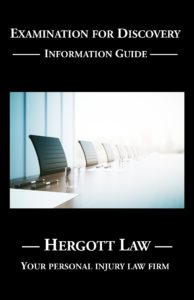This column is a follow-up to a previous one about a dreaded event in an ICBC claim or other personal injury claim: the examination for discovery.
To bring you up to speed, an examination for discovery is an opportunity for the ICBC lawyer to ask you questions, under oath with every word spoken is recorded, word for word, by a court reporter.
The main theme of my previous column was that an examination for discovery needn’t be as stressful as you might think, i.e. all you have to do is tell the truth. I concluded, though, with an example of insurance lawyer trickery, and I promised to follow that up with other examples.
Here is a link to that other column: Examination for discovery need not be stressful.
Imagine yourself in the hot seat. You have been sworn to tell the truth. There is an ICBC lawyer sitting across the table from you and you are required to answer his or her questions.
You feel intimidated. You have been warned that the lawyer will try to get you to say things that will hurt your ICBC claim. You feel completely outmatched.
Your lawyer has told you the things I wrote in my previous column. You have nothing to worry about. All you have to do is tell the truth in an examination for discovery and justice will prevail.
That’s all fine in theory. You also need to be warned about trickery. One form comes from getting you to agree with a series of propositions that seem fair and reasonable but lead to an unfair conclusion when put together.
It is a classic piece of trickery. You are asked: “You are honest and up front with your doctor when you consult with her, right?”
Well, shoot. How could you not agree with that?
Similarly: “You don’t hide anything from your doctor; you tell your doctor about all your complaints, right?” To disagree with that would be to suggest that you are dishonest.
“You agree that your doctor writes down what you report to her in her clinical records, right?”
In preparation for the examination for discovery, you have reviewed the clinical notes that your doctor has taken during your visits with him or her. Of course, those notes would have been based on what you told your doctor. You also agree with that proposition.
Then comes the unfair conclusion. You are shown clinical records of doctor visits over a six-month period approximately two years after the crash. The word headache doesn’t show up in any of the notes your doctor made during those visits.
“Clearly, you did not have any headaches over that six month period, right?”
You are stunned. The conclusion sounds so logical. It was based on premises that you are honest and forthright and don’t hide anything from your doctor. How could you NOT agree with the conclusion?
You feel that if you disagree, you are saying that you are one of those bad apple ICBC claimants who try to defraud the system.
You are under oath at your examination for discovery. The ICBC lawyer is staring at you, waiting for an answer. You feel you have to agree.
The problem is that you have had a headache every waking moment since the day of the crash.
The conclusion that appeared logical was based on fallacies. In reality, honest and forthright people don’t always tell their doctors everything that is wrong.
If you have had a constant headache for two years straight, why would you bother reminding the doctor that you still have a headache?
If you see your doctor about a sore throat, why would you mention your car crash symptoms?
Also, the reality is that doctors do not record everything that you tell them. How could they? They are not stenographers. They make notes of what they think is useful information for the purpose of treating you. It is not their job to carefully document all your symptoms to help you get a fair result from ICBC.
Even if you did mention your chronic headache to your doctor, why would he or she have made a note of it if it was just more of the same?
Bottom line: it is bunk to conclude that a symptom did not exist if it was not noted in a clinical record.
How do you protect yourself from this type of trickery in an examination for discovery? It’s quite easy. All of the trickery can be neutralized if you follow the golden rules of listening to the question, thinking before blurting out an answer, and being truthful and honest.
If the conclusion seems logical, but it is not true, then disagree with it. Don’t worry about how things might look.
Are you interested in seeing the actual, legislated, rules about an examination for discovery? If so, click here: Rules of Court – examination for discovery rules.
You might also enjoy:
Examination for Discovery need not be stressful gives a basic description of what an EFD looks like, as well as golden rules to follow
Examination for discovery warnings cautions about being second guessed, with 20/20 hindsight, about every decision you’ve made related to medical care, income loss and the impact on your life.
Examination for Discovery has many topics on the table discusses what range of information you might be questioned on at your EFD.


Brad
Thank you for the information, it has made me feel better about my upcoming Discovery!